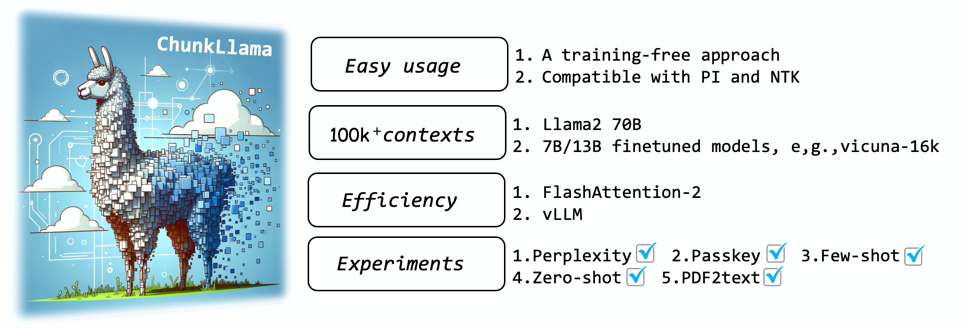Dual chunk attention is a training-free and effective method for extending the context window of large language models (LLMs) to more than 8x times their original pre-training length. We refer to the Llama-based model with dual chunk attention as ChunkLlama. DCA can be seamlessly integrated with (1) popular extrapolation methods such as Positional Interpolation (PI) and NTK-Aware RoPE; and (2) widely-used libraries for memory-efficient inference like FlashAttention and vLLM.
Due to the high cost of continual pretraining on longer sequences, previously released long-context models are typically limited to scales of 7B/13B. We demonstrate that by applying DCA to Llama2 70B, the model exhibits surprising extrapolation capabilities (100k context length) and a very strong understanding of practical long-context tasks.
As a training-free method, only one line needs to be added to your original inference code for the Llama2 model:
replace_with_chunkllama(pretraining_length=4096)from transformers import AutoTokenizer, AutoModelForCausalLM
from chunkllama_attn_replace import replace_with_chunkllama
##### add this line #####
replace_with_chunkllama(pretraining_length=4096)
tokenizer = AutoTokenizer.from_pretrained("meta-llama/Llama-2-7b-hf", trust_remote_code=True)
model = AutoModelForCausalLM.from_pretrained("meta-llama/Llama-2-7b-hf", trust_remote_code=True, torch_dtype=torch.bfloat16)
inputs = tokenizer("Long...docs\n Q: How to extend the context window of LLMs? ", return_tensors="pt")
output_ids = model.generate(**inputs, max_length=128)[0]
print(tokenizer.decode(output_ids))We have provided a collection of influential papers on long-context scaling of LLMs in the Popular_PDFs directory. By using the --pdf parameter, you can access the latest advancements in this field through ChunkLlama⭐.
- Prepare the environment.
pip install -r requirements.txt
pip install flash-attn --no-build-isolation (FlashAttention >= 2.0.1)- Download the pretraining weights (Extended ctx means the context length enabled by DCA).
| Supported Models | Extended ctx |
|---|---|
| Base Models | |
| Llama-2-7b-hf (4k) | 32k |
| Llama-2-13b-hf (4k ) | 32k |
| Llama-2-70b-hf (4k) | 128k |
| Together's LLaMA-2-7b-32k | 200k |
| SFT Models | |
| Llama-2-7b-chat-hf (4k) | 32k |
| Llama-2-13b-chat-hf (4k) | 32k |
| Llama-2-70b-chat-hf (4k) | 128k |
| Vicuna-1.5-7b-16k | 200k |
| Vicuna-1.5-13b-16k | 200k |
| Mixtral 8x7b | todo |
| Qwen1.5 中文 | todo |
| ChunkLlama-sft-7b-16k (ours) | 200k |
| ChunkLlama-sft-13b-16k (ours) | 200k |
- Deploy your own demo.
We provide three examples of how to employ DCA on popular LLMs in
run_chunkllama_100k.py,run_together_200k.pyandrun_vicuna_200k.py.
Run the demo:
python run_chunkllama_100k.py --pdf Popular_PDFs/longlora.pdf --scale 13b (7b/13b/70b)📌 Notice: We have found that although 7B models can achieve low perplexity on long contexts, they often make mistakes in practical tasks, including those with fine-tuned versions. Therefore, we recommend using the larger 13B (ChunkLlama-13b, Chunk-Vicuna-13b) or 70B (ChunkLlama-70B) models for higher accuracy.
ChunkLlama can be further improved by fine-tuning on long conversations. We further train ChunkLlama on with a context window of 16k on concatenated dialogues from the previous SFT datasets ShareGPT and AlpacaGPT4. The data we use is available here
cd fine-tune
export CUDA_VISIBLE_DEVICES=0,1,2,3,4,5,6,7
export WANDB_MODE=dryrun
python -m torch.distributed.run --nproc_per_node=8 \
train_chunkllama_16k.py \
--model_name_or_path meta-llama/llama-2-7b-chat-hf \
--bf16 \
--output_dir checkpoints/chunkllama-7b-release \
--max_steps 1600 \
--per_device_train_batch_size 1 \
--per_device_eval_batch_size 1 \
--gradient_accumulation_steps 2 \
--evaluation_strategy no \
--save_strategy steps \
--save_steps 400 \
--save_total_limit 2 \
--learning_rate 2e-5 \
--weight_decay 0. \
--warmup_ratio 0.03 \
--lr_scheduler_type "cosine" \
--logging_steps 1 \
--fsdp "full_shard auto_wrap" \
--fsdp_transformer_layer_cls_to_wrap 'LlamaDecoderLayer' \
--tf32 True \
--model_max_length 16384 \
--gradient_checkpointing True \
--lazy_preprocess True \
--pretraining_length 4096You can change --model_name_or_path, --output_dir to your own directory. In our experiments, we directly train the chat version of Llama2, you can also use its base version.
This section contains the data and code for validating ChunkLlama on different types of long-context tasks.
cd ppl
python test_ppl.py --seq_len 16384 --scale 13b (7b/13b/70b)where --seq_len 16384 denotes the length of input prompts. We use tokenized the tokenized validation split of PG19 provided by longlora. The data is stored in ppl/data/pg19.validation.bin.
We provide a manner to test the passkey retrieval accuracy. For example,
cd passkey
python test_passkey.py --seq_len 16384 --scale 13b (7b/13b/70b)The experimental settings of few-shot learning are the same as that in Llama2 Long. We use 4 popular long-context benchmarks: NarrativeQA, QMSum, Qasper, and Quality. We also release the data together with in-context examples in few-shot-data. We report the results on their validation sets. The in-context examples are randomly selected from the training set.
cd few-shot
python test_few_shot.py --data_path data/few_shot_quality.jsonl --max_length 16k --scale 13b where --data_path denotes the path to the dataset assuming the data is saved in few-shot/data/.
The generation results will be saved to Predictions/Chunkllama-13b16k/few_shot_quality.json
We use the validation scripts provided by Scrolls to obtain the results:
python auto_eval.py --dataset_name quality --metrics_output_dir ./ --predictions Predictions/Chunkllama-13b16k/few_shot_quality.json --test_data_file data/few_shot_quality.jsonlWe also test our method on the chat version of Llama2 on zero-shot learning tasks. Considering the challenges of fair evaluation on open-ended tasks. We select 4 closed-ended tasks from L-Eval with diverse input lengths ranging from 3k to 27 tokens.
cd zero-shot
python test_zero_shot.py --task_path Closed-ended-tasks/coursera.jsonl --max_length 16k --scale 13bThe experimental settings and evaluation scripts are the same as those in the official repository of L-Eval.
python Evaluation/auto_eval.py --pred_file Predictions/Chunkllama-13b16k/coursera.jsonl We sincerely appreciate the assistance provided by the following people (works) for ChunkLlama:
- We gain useful background and insights from Jianlin Su's blogs. We recommend interested researchers to read his blogs to get a better understanding of the long-context scaling of LLMs.
- This work is built upon the LLaMA2 as the pre-trained models. We also use Vicuna, Together's Llama2 fork, and CodeLlama.
- We use the code from LongChat for the finetuning process and code from longlora for validating our method.
- We thank Yukang Chen for his help and valuable discussions.
- We thank Hang Yan for his valuable comments on this work.
@misc{an2024trainingfree,
title={Training-Free Long-Context Scaling of Large Language Models},
author={Chenxin An and Fei Huang and Jun Zhang and Shansan Gong and Xipeng Qiu and Chang Zhou and Lingpeng Kong},
year={2024},
eprint={2402.17463},
archivePrefix={arXiv},
primaryClass={cs.CL}
}
- ChunkLlama is licensed under the Apache License 2.0. This means that it requires the preservation of copyright and license notices.
- Data and weights are under CC-BY-NC 4.0 License. They are licensed for research use only, and allowed only non-commercial. Models trained using the dataset should not be used outside of research purposes.




